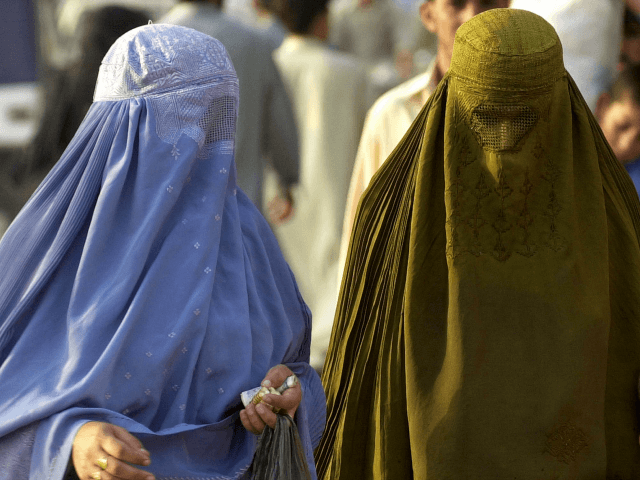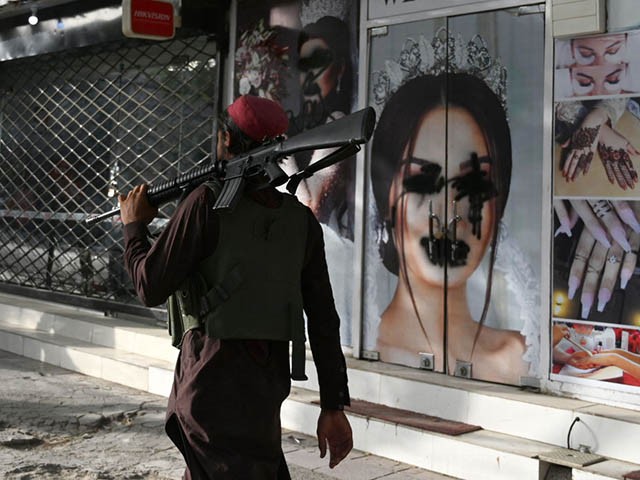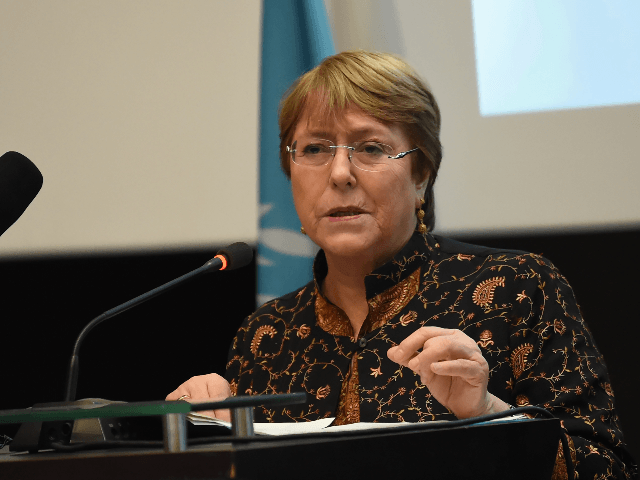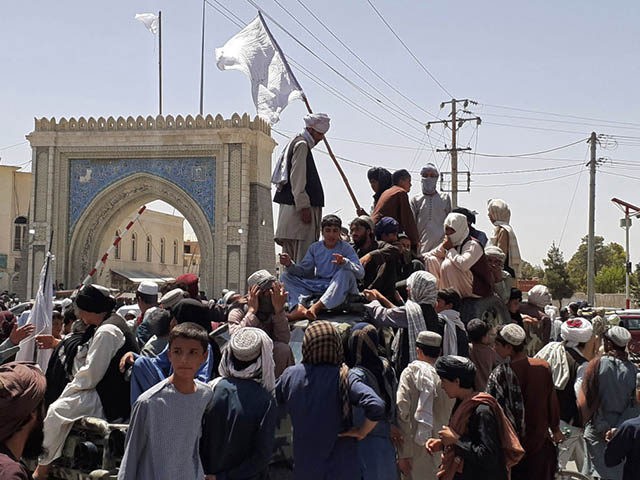The U.N. Human Rights Council (UNHRC) held a special session on Afghanistan on Tuesday and remarkably failed to condemn the Taliban, document its abuses, or create a commission for further inquiry.
The draft UNHRC resolution, reportedly written by Pakistan, did not mention the Taliban by name.
The resolution expressed “deep concern for the displacement in Afghanistan that has caused many Afghan civilians and persons of other nationalities to take refuge in neighboring and other countries,” reaffirmed “the importance of combating terrorism while fully respecting human rights in Afghanistan,” and reiterated the U.N.’s “unwavering commitment to the rights of women and girls,” but did not hold the Taliban responsible for offenses against any of those principles.

Two Afghan women wearing burqas walk in the Nasser Bagh refugee camp September 26, 2001 in Peshawar, Pakistan. Millions of Afghan refugees are already in camps in Pakistan, and aid workers fear a humanitarian catastrophe if more are forced out by a Western attack on Afghanistan’s ruling Taliban. (Photo by Chris Hondros/Getty Images)

A Taliban fighter walks past a beauty salon with images of women defaced using spray paint in Shar-e-Naw in Kabul on August 18, 2021. (Photo by Wakil KOHSAR / AFP) (Photo by WAKIL KOHSAR/AFP via Getty Images)
The UNHRC resolution declared that “sustainable peace can be achieved only through a comprehensive and inclusive Afghan-led and Afghan-owned political process, with the full and meaningful participation of all Afghans, including persons belonging to ethnic and religious communities and women,” but did not acknowledge that the Taliban just conquered the entire country by military force and deposed the U.N.-recognized legitimate government.
The resolution concluded by calling on “all parties” to “respect their obligations under international law, including international human rights law and international humanitarian law,” including the “right to liberty of movement and freedom to leave the country.” The Taliban banned Afghan citizens from entering the Kabul international airport a few hours after the UNHRC resolution was written.
Human rights activists were stunned and horrified by the outcome of the UNHRC session. Amnesty International (AI) called it “shameful” and dismissed the resolution produced by the session as “weak.”
“The U.N. Human Rights Council special session has failed to deliver a credible response to the escalating human rights crisis in Afghanistan. Member states have ignored clear and consistent calls by civil society and U.N. actors for a robust monitoring mechanism,” said AI Secretary General Agnes Callamard.
Callmard pointed to AI’s own documentation of a Taliban ethnic massacre in July as evidence of the Islamist regime’s brutality.
“Many people in Afghanistan are already at grave risk of reprisal attacks,” she warned. “The international community must not betray them, and must urgently increase efforts to ensure the safe evacuation of those wishing to leave. States must now move beyond handwringing, and take meaningful action to protect them.”
“U.N. member states must correct today’s failure when the Human Rights Council meets again in a few weeks. A robust investigative mechanism — with a mandate to document, collect and preserve evidence of ongoing crimes and human rights violations across Afghanistan — is urgently needed,” Callamard demanded.
U.N. Watch Executive Director Hillel Neuer called Tuesday’s resolution “one of the most watered-down” in UNHRC history.
“In the context of U.N. Human Rights Council special sessions, this resolution is an outrage,” he said, contrasting it with the far more detailed and accusatory resolutions like the one the UNHRC issued in special session on Syria in October 2016.
“Better to have had no U.N. session at all than this gross dereliction of duty and green light of impunity for the Taliban,” Neuer said.
The weak statement from UNHRC is all the more remarkable because U.N. High Commissioner for Human Rights Michelle Bachelet said on Tuesday she has received credible reports of “summary executions” by the Taliban, against both captured Afghan soldiers and civilians.

UN High Commissioner for Human Rights, Michelle Bachelet, addresses a symposium titled “AHD al-Aman” in the Tunisian capital, Tunis, on June 13, 2019. (Photo by FETHI BELAID / AFP) (Photo credit should read FETHI BELAID/AFP/Getty Images)
Bachelet also cited reports of the Taliban recruiting child soldiers, using violence to crush peaceful demonstrations, and preventing women from working or attending school.
“A fundamental red line will be the Taliban’s treatment of women and girls, and respect for their rights to liberty, freedom of movement, education, self-expression and employment, guided by international human rights norms,” she said.
“I urge this council to take bold and vigorous action, commensurate with the gravity of this crisis, by establishing a dedicated mechanism to closely monitor the evolving human rights situation in Afghanistan,” Bachelet testified to the Human Rights Council, calling for the commission of inquiry that UNHRC decided not to establish.
The United Nations Children’s Fund (UNICEF) was optimistic about working with the Taliban last week, praising the Taliban because it allegedly “expressed support” for allowing girls to attend school. It is possible, given the U.N.’s concerns about the humanitarian situation in Afghanistan, that its agencies have prioritized maintaining access to deliver food and medical aid, so they are avoiding actions or statements that might alienate the Taliban conquerors.

COMMENTS
Please let us know if you're having issues with commenting.